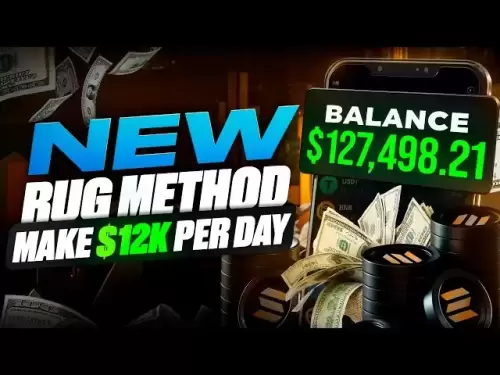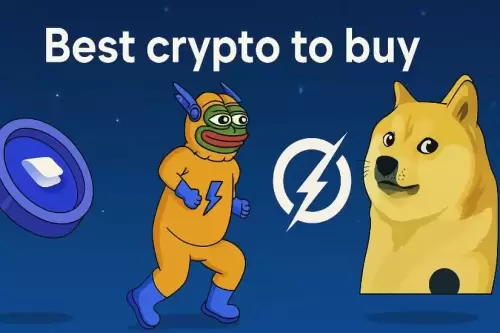 |
|
 |
|
 |
|
 |
|
 |
|
 |
|
 |
|
 |
|
 |
|
 |
|
 |
|
 |
|
 |
|
 |
|
 |
|
Cryptocurrency News Articles
SEC Commissioner Hester Peirce says most NFTs with creator royalty mechanisms likely fall outside the purview of federal securities laws.
May 21, 2025 at 04:19 pm
United States Securities and Exchange Commission (SEC) Commissioner Hester Peirce said many non-fungible tokens (NFTs), including those with mechanisms to pay creator royalties, likely fall outside the purview of federal securities laws.
United States Securities and Exchange Commission (SEC) Commissioner Hester Peirce has said many non-fungible tokens (NFTs), including those with mechanisms to pay creator royalties, likely fall outside the purview of federal securities laws.
In a recent speech, Peirce said NFTs that allow artists to earn resale revenue do not automatically qualify as stocks. Unlike stocks, NFTs are programmable assets that distribute proceeds to developers or artists. The SEC official said that mirrors how streaming platforms compensate musicians and filmmakers.
“Just as streaming platforms pay royalties to the creator of a song or video each time a user plays it, an NFT can enable artists to benefit from the appreciation in the value of their work after its initial sale,” Peirce said.
Peirce added that the feature does not provide NFT owners any rights or interest in any business enterprise or profits “traditionally associated with securities.”
SEC never prohibited NFT royalties
Oscar Franklin Tan, chief legal officer of Enjin core contributor Atlas Development Services, told Cointelegraph that recent remarks by Peirce on NFTs and creator royalties have been widely misunderstood.
Peirce had clarified that NFTs which send resale royalties to artists are not necessarily securities, a view Tan says is legally sound but mischaracterized in some media reports.
“So Hester Peirce said that an NFT which sends royalties back to the creator after a sale is not a security. This is correct, but the way some media reported this is completely out of context,” Tan told Cointelegraph. “The actual context is that this is not controversial, and it was never considered a security.”
The lawyer said US securities law is focused on regulating investments and not compensating creators for their work.
The lawyer said US securities law is focused on regulating investments and not compensating creators for their work.
“The artist or creator is not an investor, not a passive third party in the NFT,” he said, noting that royalty payments are not considered investment income.
Instead, Tan told Cointelegraph that this type of earning is “analogous to business income,” which the SEC does not regulate. He added:
“If you create a piece of music and someone streams it a million times, the music streaming platform will send you royalties from the streaming fees. No one will say that the streaming platform’s token is a security.”
Tan explained that the legal distinction becomes more complicated when NFTs promise shared profits from royalties to multiple holders beyond the original creator.
Tan also urged regulators and market participants to apply traditional legal reasoning to new blockchain technologies. “Ask yourself, if this were done by pen and paper, would there still be a regulatory issue?” he said. “If none, slow down.”
Related: SEC charges Unicoin crypto platform over alleged $100 million fraud
OpenSea calls on the SEC to exempt NFT marketplaces from oversight
While NFT royalties may not have been a controversial SEC issue, NFT marketplaces are a different case. In August 2024, NFT trading platform OpenSea received a Wells notice from the SEC, alleging that NFTs traded on the marketplace could qualify as unregistered securities.
On Feb. 22, OpenSea CEO Devin Finzer announced that the SEC has officially closed its investigation into the platform. The executive said that this was a win for the industry.
Following the conclusion of the SEC’s investigation, OpenSea’s lawyers penned a letter to Peirce, who leads the SEC’s Crypto Task Force. OpenSea general counsel Adele Faure and deputy general counsel Laura Brookover said in an April 9 letter that NFT marketplaces don’t qualify as brokers under U.S. securities laws.
The lawyers said the marketplaces don’t execute transactions or act as intermediaries. The lawyers urged the SEC to “clearly state that NFT marketplaces like OpenSea do not qualify as exchanges under federal securities laws.”
Disclaimer:info@kdj.com
The information provided is not trading advice. kdj.com does not assume any responsibility for any investments made based on the information provided in this article. Cryptocurrencies are highly volatile and it is highly recommended that you invest with caution after thorough research!
If you believe that the content used on this website infringes your copyright, please contact us immediately (info@kdj.com) and we will delete it promptly.





























































